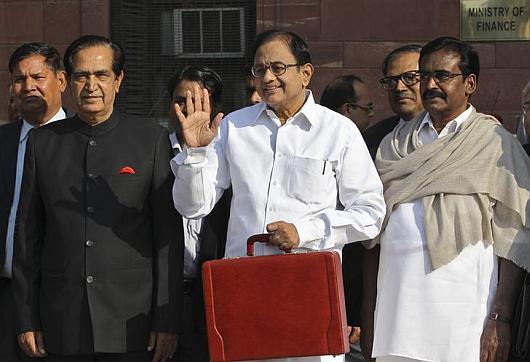Photographs: Reuters Manoj Kumar and Rajesh Kumar Singh in New Delhi
India must make tough spending choices, Finance Minister P. Chidambaram said on Thursday, as he unveiled one of the most highly anticipated budgets of recent years.
"Faced with a huge fiscal deficit, I have no choice but to rationalise expenditure. We took a dose of bitter medicine. It seems to be working," Chidambaram said in his budget speech, a balancing act to stave off a credit rating downgrade and meet demands for populist spending heading into an election year.
The 2013-14 budget caps an intensive campaign by the energetic finance minister since he was appointed last August to turn around the fortunes of Asia's third-largest economy after years of policy drift and global economic turmoil.
"Wisdom lies in finding the correct level of government expenditure," he said in his speech to parliament.
India's fiscal and current account deficits have alarmed investors and ratings agencies, triggering warnings that the country's sovereign bonds could be downgraded to 'junk' status if urgent steps are not taken to rein in spending.
Chidambaram was expected to announce plans to keep a lid on government spending in fiscal 2013-14, capping it at roughly the same level as the year ending next month, officials told Reuters, despite fears that lower public expenditure risks deepening India's sharpest economic downturn in a decade.
Economists expected him to unveil measures to widen the tax net to boost government revenues, lay the groundwork for a goods and services tax, reduce the government's huge subsidies bill, announce plans to sell more stakes in state-owned enterprises and raise import duties to dampen demand for gold.
Investors were watching closely to see whether the three-times finance minister - seen as a possible candidate for prime minister in 2014 - fulfilled a promise of fiscal prudence or sowed the budget with vote-winning, but expensive, welfare handouts.
Chidambaram was also under pressure to deliver credible assumptions on economic growth, revenue and expenditure, after recent Indian budgets proved optimistic.
Chidambaram has staked his reputation on hitting a fiscal deficit target of 5.3 percent of GDP this year and 4.8 percent in 2013-14. A no-nonsense, Harvard-educated, lawyer who commands both respect and fear in government, he has squelched opposition from cabinet colleagues worried that spending cuts could ignite a backlash among voters.
Chidambaram has focused on winning back foreign investors unnerved by proposals of his predecessor, Pranab Mukherjee, to tax merger deals retrospectively and clamp down on tax evasion. Since September, he has implemented a spate of investor-friendly reforms, including allowing entry of foreign supermarkets.
This year, however, a flagging economy has left him with little room for big-bang populist measures. The government estimates economic growth for fiscal 2012-13 will be 5 percent, nearly half of what it was in 2007-08.
In its annual economic survey released on the eve of the budget, the finance ministry said the economic slowdown was a "wake-up call for increasing the pace of actions and reforms". It projected growth in the coming year of 6.1-6.7 percent.



article